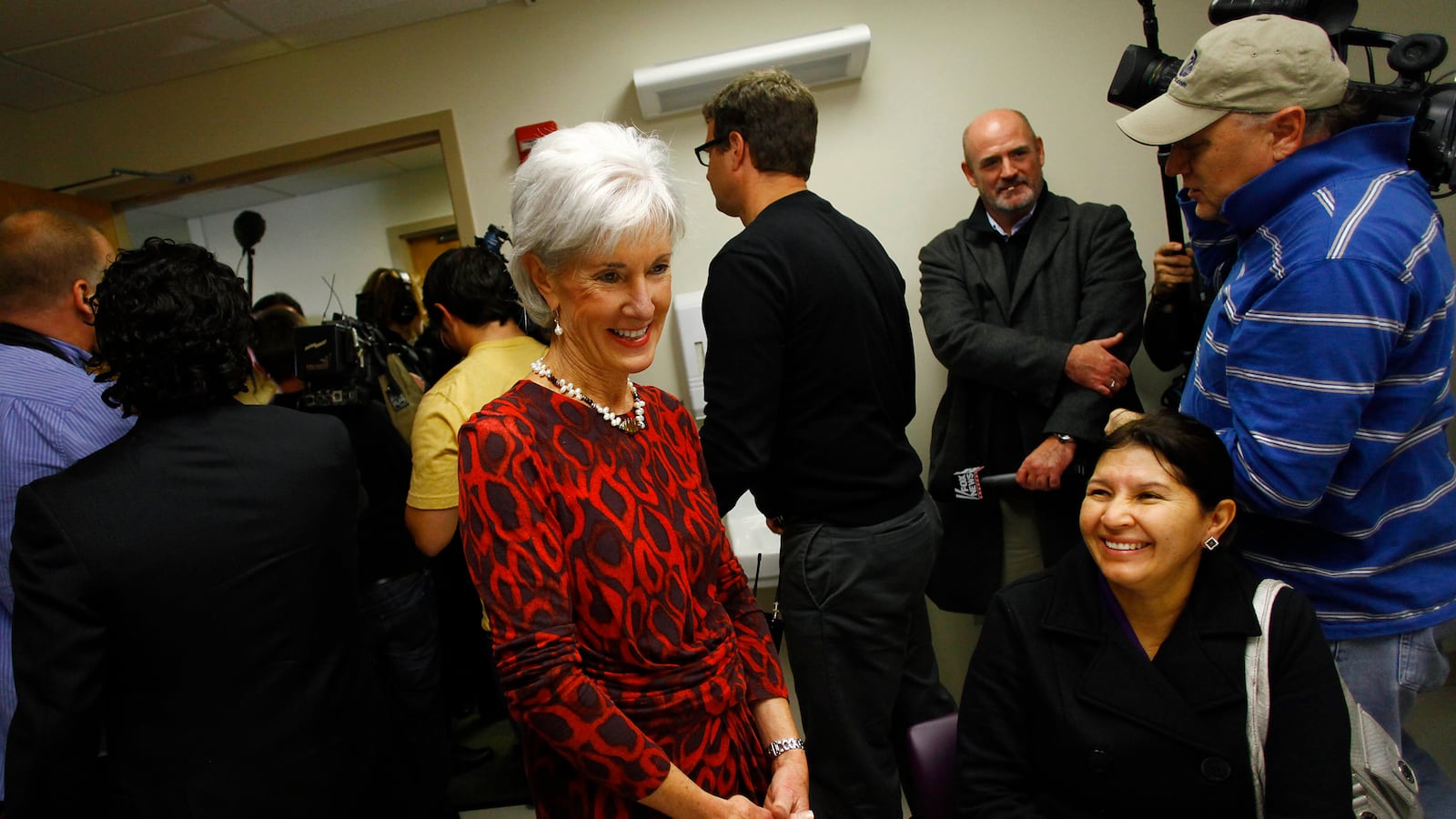The good news stories are beginning to catch up with the bad news stories that made the rollout of the Affordable Care Act such a disaster. The problem is that it’s hard to make a second first impression, and it will take a long while before Obamacare and HealthCare.gov aren’t a punching bag for the late night talk shows, and the political target of choice for Republicans.

Every day there are emails touting a previously uninsured or underinsured person in some state exchange finding a health-care policy that’s just right for them and their family. On an almost daily basis, the White House makes a top official available to take questions and give the latest update on the troubled website and the progress that’s being made. Tuesday it was Health and Human Services Secretary Kathleen Sebelius’s turn to rally the troops on a conference call with state and local elected officials who are working to boost enrollment.
Reporters were allowed to listen in, and anyone expecting that Sebelius might get a tongue-lashing from some of the participants because of all the problems heard just the opposite. “Keep your head up, don’t let them get you down…You’re doing a good job,” an official from Pennsylvania told Sebelius. He just wanted her to repeat the enrollment dates. Only one date has been changed, she said. People who had until December 15 now have until December 23 to sign up for coverage that would begin January 1.
She thanked everybody for their “incredibly impressive” work as “validators” who could talk about the benefits of the ACA, mobilize people to sign up, and tap into community events. She stressed that the administration is only eight weeks into a 26-week open enrollment period. Citing a town hall event in Houston that attracted almost 2,000 people, Sunday after-church activities in Florida with hundreds of churches participating, and an enrollment fair in Cleveland organized by the mayor with 30 groups, she urged those on the call, “Please continue to think strategically and creatively and continue to press on as we move forward with open enrollment.”
An official in Milwaukee asked if she had data on who is and who isn’t showing up “so we can tailor our outreach.” Sebelius replied, not entirely believably, that she didn’t have the data by age and Zip code but that the “young uninsured sometimes take the most work to get their attention and their focus.” Listening in to the conversation, I was tempted to say, “We know that. What are you doing about it?” Getting those young invincibles in significant numbers is the difference between success and failure for Obamacare.
A state representative in Florida asked, “What can local officials do in states that have not expanded Medicaid?” Sebelius replied that often the most powerful partners in this debate are business leaders, and she advised working on the argument that the ACA is a good return on investment. Florida assets are going to pay for uncompensated care, and productivity goes down when workers and students do not have health-care coverage. There’s also the moral case, she said, that you don’t want to leave out the working Americans with the lowest income.
Sebelius reported that 30 governors now have endorsed Medicaid expansion. They include Republican governors Kasich of Ohio and Snyder of Michigan who have been able to put it in place, and others like the governors of Pennsylvania and Florida who have said they want to pursue expansion but are facing opposition from their legislatures.
Eight weeks into open enrollment, Sebelius said work is “definitely on track to have a different user experience” online and that the improvements will continue well beyond December 1. “I would urge you and your folks not to hesitate to recommend people go to HealthCare.gov.” As for those canceled policies that had everybody in an uproar, she repeated the now familiar argument that people in the individual market can keep their policies for another year if state regulations allow. Among the good news stories beginning to surface are people with canceled policies who are discovering a better deal when they go to the health exchanges. It’s getting these stories out that is the administration’s challenge and the reason why Sebelius and other top officials will continue to travel the country and hold conference calls like the one Tuesday. They need to rally support in the states where people have a markedly different impression of this landmark legislation than what’s heard from the politicians in Washington.






